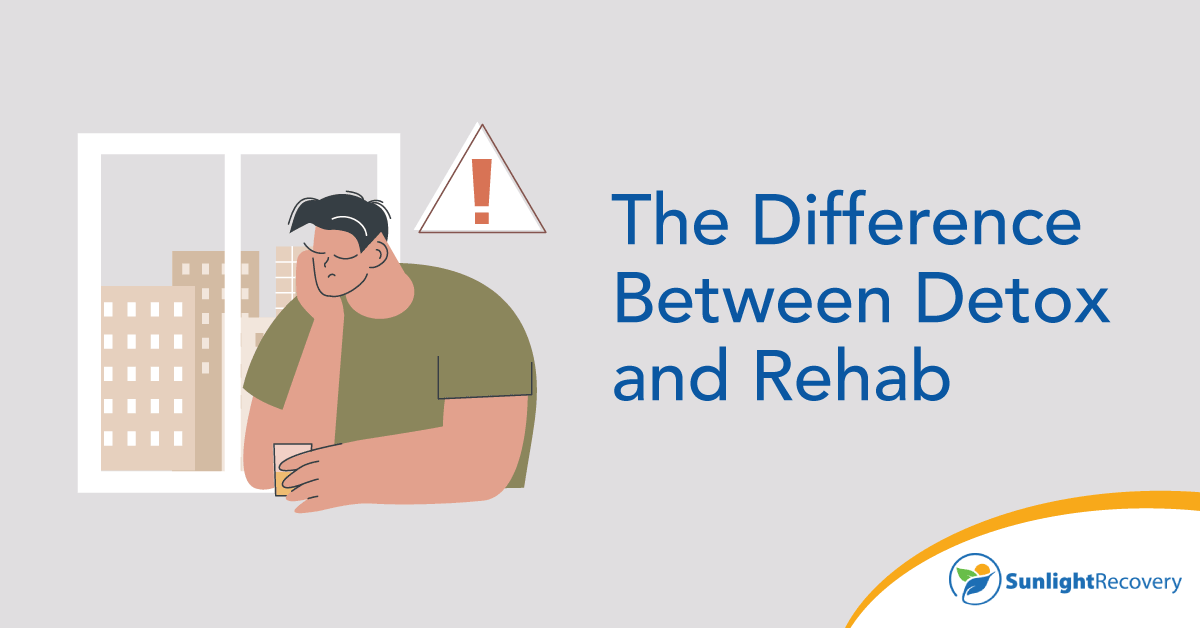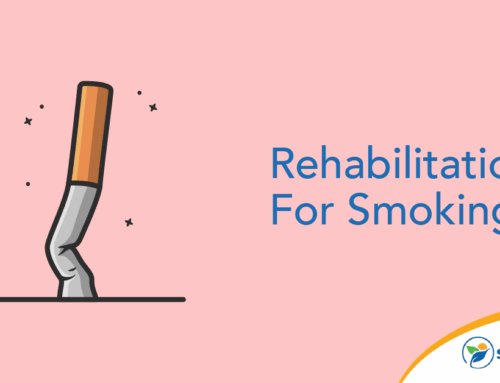The terms rehab and detox are often used interchangeably, but they’re not the same program. Detox is often a stage at the beginning of rehab and is offered by rehab centers. Keep reading for a complete overview of rehab versus detox programs, including what makes them different and the purpose of each.
Rehab vs. Detox: What’s the Difference?
So, what’s the difference between detox and rehab? Detoxification, also known as detox, is the process of clearing substances out of a person’s body. This is typically a necessary first step before someone continues down the road to recovery. After detoxification, the person can concentrate on their rehabilitation (rehab) program. Rehab is a structured program that helps the patient address all the different aspects of their addiction.
What Is Detox?
A person who wants to overcome their addiction will first typically need to go through the detox process, also sometimes known as withdrawal treatment.
Purpose and Goals of Detox
The purpose of detox is to clear the substance out of the body so the patient can move on to rehabilitation. A detox program monitors a patient to ensure they’re safe throughout the withdrawal process. Detoxification can look different for every individual but may include physical and psychological symptoms ranging from mild to severe.
In some cases, detox can be life-threatening if it triggers a health problem.
Methods and Duration of Detox Program
Depending on the severity of the addiction and the type of substances used, the withdrawal process can take anywhere from hours to weeks (or sometimes even months). And the first side effects of detox can begin within just a few hours of your last substance usage or within a few days.
For example, alcohol withdrawal symptoms often begin within 8 hours of the person having their last drink. In more acute addictions, the first signs of withdrawal might take a few days to appear. Withdrawal symptoms tend to peak within 24-72 hours after starting but can sometimes continue for weeks. However, the average alcohol withdrawal period lasts for a few days.
Types of Detox
The types of detox patients go through include the following.
Cold Turkey
“Cold turkey” is when you decide to quit the substance and stop taking it entirely. This is the most popular approach for most people seeking sobriety, but it does come with some risks.
When your body becomes heavily reliant on a substance, it can cause severe adverse reactions when that substance is suddenly cut off. For example, those with alcohol abuse addiction are at risk of a withdrawal symptom known as alcohol withdrawal delirium. Historically, alcohol withdrawal delirium killed 20% of people who experienced it. However, with advances in care and treatment, the rate is now only 1%.
As a result, those who choose the “cold turkey” approach should strongly consider doing so under medical supervision.
Tapered
Some individuals choose to taper off their dependence on a substance. This means using less and less of it until it can be cut out entirely. The benefit of this approach is that it reduces the risk of intense withdrawal symptoms because you’re giving your body time to adjust. However, tapering means the substance is still around and an active part of your life, so the temptation is there to slip back into old habits of abuse.
Medical Detox
A medical detox is when a patient receives prescription medication, under supervision, that helps to reduce the severity of their withdrawal symptoms. For example, someone detoxing from an opioid use disorder may be given methadone, which helps stabilize and reduce opioid withdrawal-related symptoms.
Inpatient
An inpatient detox program requires the individual to live at the rehabilitation facility as they go through the withdrawal process. Their physical, mental and emotional state is monitored to ensure safety. If any withdrawal symptoms become life-threatening, a medical professional is there to intervene and help.
Outpatient
Outpatient detox programs allow patients to undergo detox in the comfort of their own homes. The individual is given instructions and asked to check in daily to ensure proper progress.
What Is Rehab?
When a person has a substance abuse addiction, their body becomes reliant on the substance(s) they use. Rehabilitation centers offer a range of programs to help people who are trying to reduce or eliminate their substance use.
Additionally, rehabilitation programs typically include educational components that aim to teach patients about the harmful aspects of substance abuse and how to cope with cravings.
Goals and Structure of Rehab Programs
A rehab program’s purpose is to help the individual heal physically, mentally and emotionally so they can achieve and maintain sobriety in everyday life. Rehab looks to give patients new tools so they can successfully go through life without relapsing.
Inpatient (Residential) Treatment
Residential treatment programs provide patients with round-the-clock care and supervision during rehabilitation. Patients move into the rehab facility and stay as long as needed, whether that’s for days, weeks or months.
Outpatient
Outpatient programs allow the individual to continue to live in their home as they work through their rehab. The patient typically checks in with the facility once or twice a day for their sessions, medication and checkups.
Aftercare
Addiction treatment is often an ongoing process. Aftercare programs are any sort of programs that help individuals maintain their sobriety once they’ve achieved it. This can include support groups and therapy.
Types of Therapies Offered in Rehab
Therapy plays a significant role in rehabilitation so the patient can understand why they started abusing substances and what triggers them to seek substances. Patients can choose from the therapy format they prefer to engage in:
- Individual therapy
- Group therapy
- Family or couples therapy
Choosing Between Detox and Rehab
So, now that you understand the differences between detox vs. rehab, you may wonder which is right for you. The answer is, you likely need both programs. As highlighted above, going through withdrawal unsupervised can be dangerous and challenging. Give yourself the best chance of a successful recovery by finding a facility for both detox and rehab. You’ll be smoothly transitioned from one program to the next as you make progress.
Addiction Treatment at Sunlight Recovery
Sunlight Recovery is a detox and residential substance abuse treatment center serving all of South Florida. Our licensed and experienced staff can help you recover in a safe, healthy way. Contact us to learn more about our programs. Your new life can start today; all you have to do is call.







